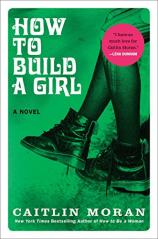Reading Group Guide
Discussion Questions
How to Build a Girl

1. Johanna’s father occupies a large role in the novel’s first chapter. How would you describe the dynamic between father and daughter?
2. How does humor affect the scandalous or painful moments in the novel?
3. How is Johanna’s eventual music writing influenced by her having to imagine songs she reads about long before she can actually listen to them?
4. Consider the many movie and book references Johanna makes throughout the novel. What do they add to your understanding of her? Which seem most surprising?
5. How has poverty affected Johanna?
6. At one point Johanna claims she has become just like her father. In what ways are they similar?
7. What’s the value of a nom de plume like Dolly Wilde for Johanna? In what ways is such an alternate identity problematic for her? For anyone?
8. What qualities make Krissi a good older brother, someone Johanna loves and needs?
9. In what ways is writing important to and valuable for Johanna?
10. Johanna feels her heart break when she sees herself on the monitors at the television studio. Why is this? Why is her visual awareness of herself so unsettling?
11. What is so compelling for Johanna about the particular music of this time?
12. Johanna is able to make a place for herself in the male-dominated world of rock music. How is she able to do this? At what cost? In what ways is she still limited by her gender?
13. Often Johanna works to pretend to be someone else. In what ways is this valuable or harmful?
14. A sharp distinction is made between being a fan or critic of music. Why might these be mutually exclusive?
15. Johanna insightfully discovers that she is valued for being sexually experienced but harshly judged for having too much sexual experience. What are the possible responses to this insight?
16. Johanna resorts to what she calls a “physical disconnect” during unpleasant sexual experiences in part because she doesn’t yet hear her own voice. How might discovering her voice alter her experience?
17. In a moment talking with Rob about music, Johanna suggests that modern technological access to music via the Internet --- where “all the facts are kept” --- has done away with the interpersonal talking and piecemeal sharing of music knowledge. Do you agree with this assessment?
18. John Kite is a vibrant and centrally important part of Johanna’s experience with music. What does he provide for her? How does he fulfill or contradict the image of a rock star?
19. Thinking about how parents sometimes limit the scope of what their children might know or become, Johanna distinguishes between being and doing. What’s the relationship between identity and behavior? Are we what we think or what we do?








